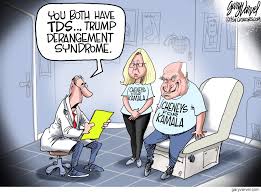Help for Trump Derangement Syndrome is Available.

There IS help for TDS sufferers. Do not despair as there is help available. Remember, the first step in curing a problem is admitting you have one.
Rehab Centers That Offer Treatment for Trump Derangement Syndrome
Trump Derangement Syndrome (TDS) is a term used to discuss people who dislike Donald Trump so intensely that they are willing to abandon all logic and reason that goes against this criticism . It is a term used by Trump himself and other Republicans to negatively describe those who are against his politics in America, including Joe Biden, Kamala Harris, Barack Obama, and other Democrats formerly in office.
The term Trump Derangement Syndrome has been used to describe individuals who oppose Trump and larger organizations that speak against him, such as The Washington Post. It is a particularly polarizing topic today as emotions are still fresh after the 2024 presidential election and in a political climate that could be described as tense at best.
Furthermore, because TDS as a cultural phenomenon grows particularly strong during election periods, people standing on all sides must have safe mechanisms for coping. In some instances, this can mean seeking professional treatment for political obsession or a related disorder.
Understanding Trump Derangement Syndrome
When talking about Trump Derangement Syndrome, it is important to understand the origin of the term and what it represents for those who use it.
The Origins of the Term
TDS is a pejorative, or derogatory, term that is most often used by Trump supporters to describe his opponents and people who dislike him. It describes people who are negative and critical towards Donald Trump but who are also described as being irrational or insane in their dislike for him.
So how did the term “Trump Derangement Syndrome” come about? The term originated out of the term “Bush Derangement Syndrome,” which was coined by Charles Krauthammer, a conservative political columnist, during the presidency of George W. Bush. It was first adapted for Trump during his 2017–2021 presidency.
What TDS Represents
TDS is not an actual diagnosed condition, however, and is a representation of political obsession and polarization, both of which can be very dangerous.
Political obsession, sometimes referred to as political obsession disorder, refers to someone so obsessed and engaged with current politics that it is negatively affecting their daily life. Political polarization, on the other hand, occurs when people veer towards ideological extremes in their political beliefs.
When political obsession and political polarization are found together within the same individual, it can be a scary and dangerous combination.
Symptoms of Political Polarization
Political polarization can result in symptoms that include intense emotional reactions, especially during political topics or when discussing Donald Trump. These emotional outbursts can result in strained relationships with loved ones and even cause people to withdraw socially from family and friends.
Withdrawal and isolation can present further dangers in that they can lead the person suffering from political obsession to overly consume media that is related to Donald Trump in any way.
The Psychological Impact of Political Obsession
Political obsession can not only affect people on the surface and in their personal relationships and professions, but it can have deep psychological implications as well.
Emotional Overload
Political obsession can easily turn into emotional overload, especially during an election year or shortly after when coverage of the candidates is still going strong. This can result in extreme anxiety, anger, or frustration, especially during political events or when discussing them.
To make matters worse, people who are in the throes of political obsession may actively seek out encounters and situations that are known to trigger strong emotional reactions. One study conducted in 2017 found that the stress associated with politics can be equivalent to, if not worse than, the stress associated with an alcohol use disorder.
Social and Familial Strains
Differing political views can put strains on social and familial relationships, especially when people have strongly opposing views that they are both very passionate about. Someone with Trump Derangement Syndrome could find it difficult to hear the viewpoints of others.
In some instances, the strain can be so strong that family members completely avoid each other or refrain from speaking to or seeing each other. While it may be easier said than done, family members may want to set boundaries for each other in terms of discussing politics and making sure to put family first.
Broader Cultural Implications
The broader cultural implications of TDS are multifaceted and reflect the deep political polarization in the United States.
Some of these broader cultural implications include:
Increased polarization: TDS highlights the growing divide between political factions. It underscores how political discourse has become more emotionally charged and less focused on policy and facts.
Impact on public discourse: The term is used to discredit critics of Trump, suggesting that their opposition is based on irrational hatred rather than legitimate concerns. This can stifle meaningful debate and reduce the quality of public discourse.
Social division: TDS can contribute to social division, as individuals become more entrenched in their beliefs and less willing to engage with opposing viewpoints. This can lead to increased conflict and a breakdown in social cohesion.
Media and perception: The media plays a significant role in shaping perceptions of TDS. Pro-Trump media outlets often use the term to dismiss criticism, while anti-Trump media may highlight the term’s use as a tactic to avoid addressing important issues.
Rise of echo chambers: An environment where a person only encounters information or opinions that agree with or reinforce their own opinions and feelings. Not only can this create misinformation, but it can also distort a person’s viewpoint so that they cannot listen to or consider other perspectives.
Broader Lessons on Political Polarization
One significant benefit of political polarization is the broader lessons it imparts, revealing deep societal divisions and prompting critical discussions about governance, cooperation, and compromise. By exposing the challenges of ideological conflict, polarization underscores the necessity of long-term solutions that promote stability, inclusivity, and sustainable progress.
Recognizing the Humanity in Opposing Views
Political polarization such as TDS provides an opportunity for people to recognize the humanity in opposing views and try to build empathy through mature dialogue. This often requires specific strategies for productive conversations and can be easier said than done, but is possible when both sides are ready to move forward.
5 Strategies for productive political conversations include:
Make a point to truly listen to one another
Stay professional and respectful
Assume that both sides have good motives
Avoid rumors, gossip, and conspiracy theories
Be able to recognize when the conversation should end
The Role of Media Literacy
It can be difficult to find media that you know to be completely true and honest, and it can also be hard to avoid sensationalism. Political polarization is a great tool for bringing attention to the importance of being critical of all the news you consume.
For this reason, you may want to use only news sources that you know to be reliable and unbiased, including the Associated Press, Reuters, The New York Times, Bloomberg, and C-Span.
Long-term Solutions for a Divided Society
Experts agree that one key solution for a divided society is to enhance education on civic engagement and critical thinking, equipping individuals with the skills to navigate complex social and political issues. Another effective long-term approach is fostering community-building initiatives that promote dialogue, mutual understanding, and social cohesion.
Some examples of ways this can be done include:
Attending local town halls or other government meetings
Volunteering for political campaigns or candidates that you support
Joining local advocacy groups or creating a new one
Running for a local office position
Writing letters to local newspapers or publications
Attending community service or volunteer events
Attending peaceful protests or demonstrations
Seeking Treatment and Building Resilience
If your political obsession has become so strong that it is interfering with your everyday life, relationships, and responsibilities, it may be time to seek treatment.
Not only can this allow you to find people and places that support you, but can also help you to build more personal resilience that can be useful in achieving more long-term happiness.
Understanding Personal Triggers
It is important to understand what triggers you have as an individual, particularly in matters related to political discourse. Once you understand what your personal triggers are, you can begin to set appropriate boundaries that help protect you from stressful situations.
These boundaries can exist in the personal conversations and relationships that you have, as well as in the American media that you allow yourself to consume.
Practical Steps for Emotional Regulation
Practicing emotion regulation techniques, such as mindfulness and meditation, can help you stay calm and composed during political discussions. Additionally, engaging in hobbies and activities unrelated to politics can provide a healthy mental break, allowing you to socialize with a diverse range of people and maintain a well-rounded perspective.
Exercise is a natural and enjoyable way to relieve stress. Whether you prefer solo activities for relaxation or group workouts for social engagement, staying physically active can boost both your mental and physical well-being.
Professional Support Options
If you are still struggling with political obsession, TDS, and polarization, you may want to consider professional support, starting with individual therapy to help manage stress and anger.
You may also want to seek out group therapy or peer support groups, where you can share your experiences and talk with others who have had similar experiences.
A final option is attending stress management workshops, where you can learn valuable skills to help you manage challenging emotions.
Finding a Treatment Center for TDS
Several things should be kept in mind while seeking a treatment center for TDS or any other type of mental health disorder. The following sections can help you understand each factor that’s an important step to consider.
Acknowledging the Need for Professional Help
Political stress and obsession can affect some people so strongly that it interferes with their relationships, jobs, daily life, and mental health. It is important to be able to recognize when this has happened to you or someone you love.
There is no shame in seeking help for politically-related stress and anxiety, and these feelings are likely more common than people realize.
Researching Suitable Treatment Options
Your first step in researching suitable treatment options is to identify your needs and what you are hoping to get out of treatment.
Next, you can determine the level of support that you need, such as individual therapy, group counseling, or stress management programs. You will also need to decide between in-person or virtual options, or whether you prefer a hybrid option that offers a combination of both.
Locating Qualified Professionals
It is important to find a licensed professional who specializes in treating patients with political stress. It can also be helpful if they specialize in treating anxiety and in providing conflict resolution. It may also be worthwhile to consider therapists or counselors who specialize in managing cultural or media-related stress and anxiety.
When finding therapists, you can use directories such as those available on Psychology Today, and TherapyDen, or a service such as RehabNet. These often allow for targeted searches based on your location or a specific therapeutic specialty that you are looking for.
Evaluating Potential Treatment Centers
Always carefully evaluate any potential treatment centers that you are interested in and visit them in person whenever possible.
Credentials and Specializations
When looking at potential treatment centers, always make sure that therapists and clinicians are properly licensed and experienced. Not only that, look for therapists who have specialty experience in issues like anxiety management, mindfulness, and conflict mediation. If they have additional experience in treating patients with political anxiety or political obsession, this is a bonus.
Reviews and Recommendations
While researching facilities you should read reviews and testimonials from past clients, if available. You can also seek referrals and recommendations from friends or colleagues that you trust who have had similar experiences.
Accessibility and Affordability
Make sure that the facility that you are interested in accepts your health insurance or offers other means of financial assistance, such as sliding fee scales, payment plans, or discounts.
The facility should also be in close enough proximity to you so that it is realistic for you to attend, especially in terms of outpatient treatment. If you are not able to attend sessions in person, the facility should offer virtual options for you.
How to Find a Treatment Center for Trump Derangement Syndrome
In today’s highly charged political climate, finding and maintaining emotional balance is more crucial than ever for individuals on both sides of the spectrum. This makes self-awareness essential, as it enables people to recognize when they need support and develop healthy coping mechanisms to navigate difficult times effectively.
Moreover, reducing political polarization requires a collective effort, with individuals, communities, and organizations all playing a role in fostering understanding, dialogue, and unity.
For assistance in finding a treatment center that addresses Trump Derangement Syndrome and other forms of political obsession, contact RehabNet.com via our contact form or call us today.
https://rehabnet.com/treatment/trump-de … -syndrome/Sorry,
Here is the correct link.
https://rehabnet.com/treatment/trump-de … -syndrome/
Mike, Great post! I couldn’t agree more — TDS is very real. I’ve seen it play out time and again, where logic goes out the window the moment Trump’s name is mentioned. What stood out to me in this article is how accurately it captures the emotional overload and obsession that can take over people’s lives. I think that’s why so many can’t even discuss politics anymore, they’re not debating policy, they’re reacting emotionally. The part that really hit home was about political obsession affecting relationships; I’ve seen that happen in families, even in my own circle. I’ve always believed that strong opinions are fine, but when hatred consumes reason, it’s time to take a step back. I found it interesting that the article mentions the roots of TDS going back to “Bush Derangement Syndrome” , it shows how this pattern has been around for years, only amplified by today’s media. It’s almost like some folks need a real detox from political addiction. I’m just glad more people are talking about it now, because the first step to fixing any problem is recognizing it’s there.

Shar,
Think about how much more interesting and better the posts from the left would be if they would simply dealt with their TDS. If they could be objective and comprehend actual facts. It would change this entire forum. It is up to the left to seek the help they need. I've provided a link that will provide actual connections with therapists who can help them. This article isn't a joke. It is a very real thing.
Related Discussions
- 3
Hidden Costs of Political Extremes: Trump Derangement Syndrome
by Sharlee 6 weeks ago
Trump Derangement Syndrome: Understanding a Modern Political-Psychological PhenomenonTrump Derangement Syndrome (TDS) is a term that has gained prominence in political discourse, often used to describe intense and irrational reactions to former President Donald Trump. While not officially...
- 7
What do you think will be the cure for Trump Derangement Syndrome?
by Jack Lee 8 years ago
What do you think will be the cure for Trump Derangement Syndrome?It has been a month since the election of Trump. So far, after protests, and media criticism, and celebrity meltdowns... it is clear they are not about to leave the US as some had threatened to do. So, what do you think will finally...
- 15
Trump Derangement Syndrome going main stream...
by Jack Lee 8 years ago
In the beginning, it was affecting a few celebrities, a few left wing politicians, a few fringe cable news anchors, a few progressive mayors, some on progressive campuses...Now it has gone main stream. When companies like Nordstrom drops Ivanka clothing line due to perceived public...
- 57
Govt Therapy Sessions: TDS Melt Downs
by Sharlee 12 months ago
Today I read a Fox article that disturbed me, revealing some troubling actions at the State Department. Let me share----- Rep. Darrell Issa, R-Calif., sharply criticized Secretary of State Antony Blinken after it was reported that the department organized therapy sessions for employees upset by...
- 3
What do you think of Whoopie Goldberg and Judge Jeanine Pirro?
by Readmikenow 7 years ago
Whoopie Goldberg was accused by Judge Jeanine Pirro of suffering from Trump Derangement Syndrome and proved she IS suffering from Trump Derangement Syndrome. I love her apology. She didn't like being accused of being hysterical after having been hysterical. Then she followed Judge...
- 52
Will Dems need 12 Step Program to get over Trump Derangement ?
by ahorseback 7 years ago
Trumps success' have been overshadowed by the negativity of Trump Derangement in general , looking at his policies I'm concerned that many on the left will certainly need a twelve step program to get over the hangovers ? Many here have either delusionally resisted or quietly...







